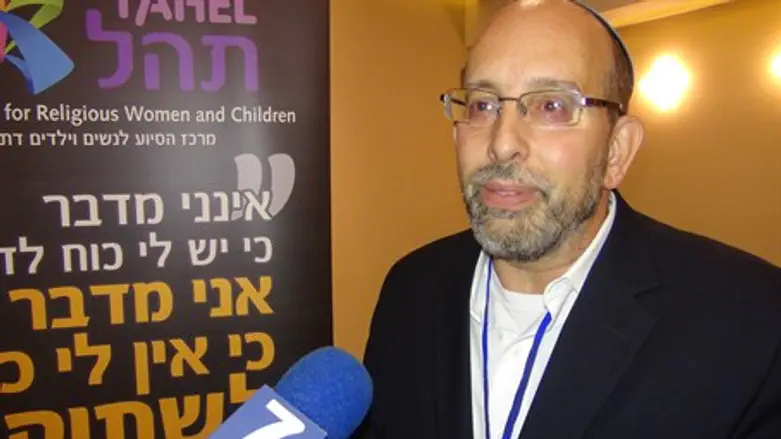
The position of a Rabbi, especially in the diaspora but in Israel as well, has taken on much more than that of a simple halachik advisor over the past couple of decades. “A Rabbi is a community leader, who has to answer questions on all type of issues and in many different areas. They have to be knowledgeable in many areas,” said Rabbi David Fine, Founder of the Barkai Beit Midrash program.
Barkai is dedicated to training communal Rabbis in Israel, and teaching them how to deal with questions of abuse that come from victims in their community.
“The Rabbi has to know when they can help and when they have to refer the person to the proper authorities or experts” said Fine.
The comments were made during an interview with Arutz Sheva, that took place during the Tahel conference that discussed abuse in the Orthodox Jewish community. The conference took place this week at the Jerusalem Ramada Hotel.
“The Rabbi does give advice in many areas. That is the role that the rabbi has fulfilled for many years throughout history, and that is the role the rabbi serves in the diaspora as well,” Fine stated.
Fine compared Rabbis to family doctors, stating that although people come to the rabbi with all types of questions, and or seeking advice, the Rabbi needs to know what questions they can answer, and when they need to refer the person to the correct specialist to get the proper treatment and care that the person needs.
“We are not training our rabbis to give business advice to people. If a rabbi steps outside of their role it doesn’t look very good for that rabbi. We are training rabbis to know the proper boundaries,” he said. “That is what we are here to learn at this conference. How to establish the proper boundaries.”
Fine also talked about the sense of loneliness that many people feel in the Jewish community, and the place of the rabbi as a stopgap for the continuing deterioration of the community. “We have lost a sense of community due in part to technology and social media. Social media has become the community for many people, but that is part of our world, and we have to take advantage of that world and use it for the proper things.’
“The rabbi’s role here is a sensitive one,” Fine continued to say. “The rabbi has to be part of this world and use all the tools that this world has to offer, but the rabbi also has to recognize that they have to have proper boundaries.”
Fine suggested taking tools such as social media and infusing them with the proper content in order to help return a sense of community to the individual. “We need to use these tools for the proper things, such as teaching Torah, giving advice, and connecting with one another.”
Returning to the issue of how to deal with situations of abuse within the community Fine addressed the problem in the following manner.
“Very often the rabbi is the first address when people want to complain about issues that they are having in the community, at work or at home. Many people face situations of abuse at home or in the work place. Be it physical, emotional, psychological, or spiritual abuse. The reason we are here is so that the rabbis can receive the kind of training that they need in order to recognize what the problems of the people who come to them are, and how the rabbi can best be able to help them, or to refer that person to the proper specialist.”